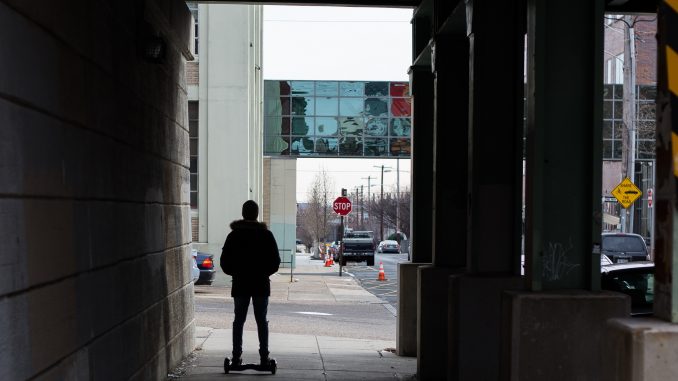
Nicholas Anderson said he believes hoverboards are “the future.”
“It sounds ridiculous, but like it’s literally a vehicle,” said Anderson, a sophomore journalism major. “It can go 15 miles an hour in three seconds. You can just travel for so long, so far, so fast.”
But at the start of the spring semester, administration banned this futuristic mode of transportation on Main Campus due to safety concerns related to fire and fall hazards.
Jim Creedon, the senior vice president for construction, facilities and operations, released a statement on Jan. 8 announcing the new ban. The statement includes a link to a December 2015 report by the U.S. Consumer Product Safety Commission, detailing the safety risks associated with hoverboards.
The fire hazard posed by some hoverboards, Creedon said, is the main safety concern of the university, in addition to lesser concerns, like pedestrian safety.
“These things are going to be charged in a classroom, they’re going to be charged in a hallway,” Creedon said. “We’re very concerned about the uncertainty of the safety of these.”
Chris Barnes, the director of operations for Sodexo at Morgan Hall, instituted his own hoverboard ban at the Morgan Hall cafeteria last semester due to his concerns that hoverboards posed a fall hazard.
Barnes had trouble enforcing this ban, though, and he asked the university for assistance at a housing meeting.
“They weren’t seeing it as a major problem at first,” Barnes said. “As it became more mainstream and the problems across the nation with these hoverboards with fires and everything else going on, they saw it was a real issue and had to be dealt with.”
Since the start of the spring semester, some off-campus establishments frequented by students have also banned hoverboards.
Both University Village and Tropical Smoothie Café joined the university in banning hoverboards for safety reasons.
Anderson, who got his hoverboard last November, said he doesn’t agree with the new university-wide ban.
“I feel like there’s a lot of dangerous things,” Anderson said. “If you’re going to ban something because of the risk of the hoverboard catching on fire I feel like there’s a million other things that we should be banning.”
Anderson said he believes it should be the responsibility of students to do their own product research to ensure their brand of hoverboard doesn’t pose a fire hazard.
Donnaizha Fountain, a junior media studies and production major, also believes the fire hazard issues related to hoverboards are linked only to certain brands.
“It can go either way because it’s so many different brands, where you can’t detect which ones are catching fire,” said Fountain, a member of the women’s basketball team. “I say it’s the cheap ones.”
Fountain received her hoverboard as a birthday gift last August.
“It feels good riding to class,” she said. “Honestly, you get an extra couple minutes of sleep in the morning.”
Fountain rode her hoverboard on campus throughout the entire fall semester and stored it in her dorm, but she said she understands why the university ban was put in place for the spring.
“You can’t really say, ‘Oh, the cheap ones are banned and the expensive ones aren’t,’” she said. “So I honestly, I agree with it. If they’re catching fire and everything it’s the best thing to do to keep everyone safe.”
“God forbid mine was to catch fire,” Fountain added. “You know that would ruin everyone’s room and stuff.”
Paige Dadich, a sophomore speech pathology major who lives on campus, said she disagrees with the university ban of hoverboards in on-campus housing.
“We’re all adults,” she said. “Most if not all of us are 18 years or older. We came to college, and we live here to have our own freedom.”
“I think that it’s one thing to say we can’t have them on campus, but to say that we can’t have them in our campus housing is a little ridiculous,” Dadich added.
The university-wide hoverboard ban applies not only to on-campus housing and other campus buildings, but also to public streets and sidewalks that run through campus.
“You can’t say, ‘You can’t bring it in, but you can ride it down Liacouras,’ because what are you going to do when you arrive at the door?” Creedon said. “It’s easier just to tell people, ‘Look, don’t run these things on campus.’”
For those students caught with hoverboards on campus, Creedon said they will be warned about the university policy and asked to comply.
“At this point, I don’t expect them to be confiscating anything, unless someone really pushes the issue,” Creedon said. “And I don’t think our students are the type that are going to push an issue over something like this.”
Jenny Roberts can be reached at jennifer.roberts@temple.edu.


Be the first to comment